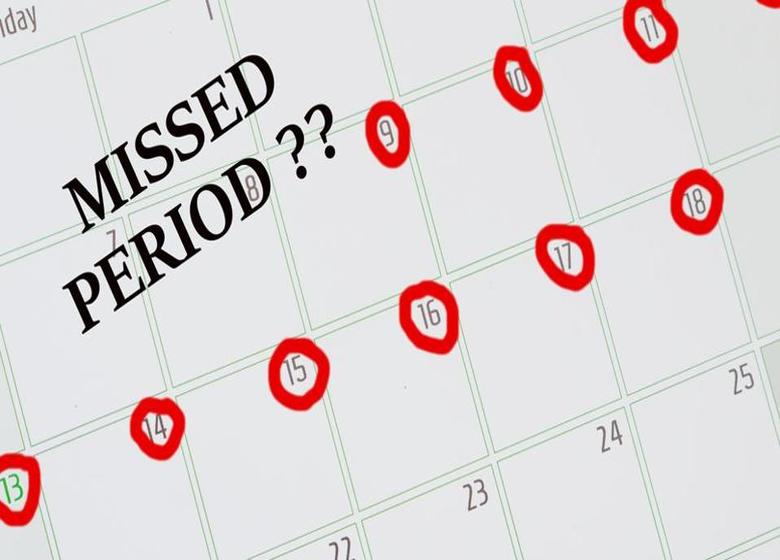Besides pregnancy, there are a number of possible reasons for a missed period. Pregnancy is by far the most common cause of a missed period, but there are some other medical reasons and lifestyle factors that impact your menstrual cycle. Extreme weight loss, hormonal irregularities, and menopause are among the most common causes if you’re not pregnant.
You may miss a period for one or two months, or you may experience complete amenorrhea, which is a lack of menstruation for three or more months in a row.
There are also two times in a woman’s life when it’s totally normal for her period to be irregular: when it first begins, and when menopause starts. As your body goes through the transition, your normal cycle can become irregular.
Most women who haven’t reached menopause usually have a period every 28 days. However, a healthy menstrual cycle can range from every 21 to 35 days. If your period doesn’t fall within these ranges, it could be because of one of the following reasons.
1. Stress

Profound stress alters the production of a gonadotrophin-releasing hormone (GnRH), interfering with ovulation and regular menstruation.
If you’re coping with an overwhelming situation or experiencing prolonged anxiety, with more than one missed period, talk to your doctor and get a referral for counseling to help you decide what to do about the issues that are causing you stress. Once your stress is back to a manageable level, it can sometimes take a few months or more for your cycles to become regular again.
If you think stress might be throwing off your period, try practicing relaxation techniques and making lifestyle changes.
2. Extreme Exercise

Extreme exercise can cause alterations in pituitary hormones and thyroid hormones, resulting in changes in ovulation and menstruation. Don’t worry about exercise causing you to miss your cycle if you work out for one or two hours per day. It takes strenuous exercise for hours and hours every day to produces these hormonal changes. If you are planning on exercising for hours every day, be sure to see a sports medicine doctor who can work with you on maintaining optimal nutrition, recommended stretching, and blood testing as needed, so that your body can support all of the physical demands that you are putting on it.
3. Low body weight

Women with eating disorders, such as anorexia nervosa or bulimia, may experience missed periods. Weighing 10 percent below what’s considered a normal range for your height can change the way your body functions and stop ovulation. Getting treatment for your eating disorder and putting on weight in a healthy way can return your cycle to normal.
4. Illness

Chronic conditions that can affect your menstrual cycles include thyroid disease, polycystic ovarian syndrome (PCOS), pituitary tumors (which may or may not be cancer), diseases of the adrenal gland, ovarian cysts, liver dysfunction, and diabetes. When any of these illnesses interfere with your cycle, it may not return to normal until the condition is treated. Congenital chromosomal conditions such as Turner syndrome and androgen insensitivity syndrome typically cause menstrual and fertility problems and are often associated with amenorrhea.
Acute illness, such as pneumonia, a heart attack, kidney failure, or meningitis, can result in rapid weight loss and nutritional deficiency or hormone dysfunction, which can cause you to miss your period during the illness. After the illness is resolved, it might take a few months before your period returns again.
5. Birth control

You may experience a change in your cycle when you go on or off birth control. Birth control pills contain the hormones estrogen and progestin, which prevent your ovaries from releasing eggs. It can take up to six months for your cycle to become consistent again after stopping the pill. Other types of contraceptives that are implanted or injected can cause missed periods as well.
6. A Change in Your Schedule
Changing schedules can throw off your body clock. If you frequently change work shifts, going from days to nights, and particularly if your schedule is erratic, your period can be fairly unpredictable. Generally, changes in schedule shouldn’t cause you to completely miss your period but can cause it to start earlier or later than expected. Your cycle can also change by a few days if you experience jet lag.
7. Medications

Some medications, such as antidepressants, antipsychotics, thyroid medications, anticonvulsants, and some chemotherapy medications, may cause your period to be absent or delayed.
Hormonal contraceptives like Depo-Provera, progesterone-only MiniPill, Mirena IUD, and Nexplanon can also influence your cycle.
8. Recently Started Periods

A normal menstrual cycle lasts from 21 to 35 days in healthy women, but it can vary. This is especially true for young women who are just starting to get their periods or for women who have not had periods for several years and are starting again. A young woman who has had just a few cycles may go months without another one until a regular pattern begins. And women who have not had a period due to contraceptive use, hormonal therapy, or illness may not resume having a regular period every month right away.
9. Breastfeeding

You may not have periods at all or you may have infrequent or very light periods when breastfeeding, particularly if breastfeeding provides your baby with all or almost all of his or her caloric intake.
10. Ectopic Pregnancy
If you think that you can’t be pregnant because you have an IUD, there is a small chance that your missed period could be a sign of an ectopic pregnancy. Ectopic pregnancy can happen sometimes due to the shape of the device and may not cause you to test positive on a pregnancy test. Your doctor can confirm or exclude this possibility with a pelvic examination or an ultrasound.
When to see your doctor?
Your doctor can properly diagnose the reason for your late or missed period and discuss your treatment options. Keep a record of changes in your cycle as well as other health changes to show your doctor. This will help them make a diagnosis.
If you have the following symptoms, contact a doctor right away:
- unusually heavy bleeding
- fever
- severe pain
- nausea and vomiting
- bleeding that lasts longer than seven days
- bleeding after you’ve already entered menopause and had not periods for a year
Also read – What is Premenstrual Dysphoria Disorder (PMDD)?













